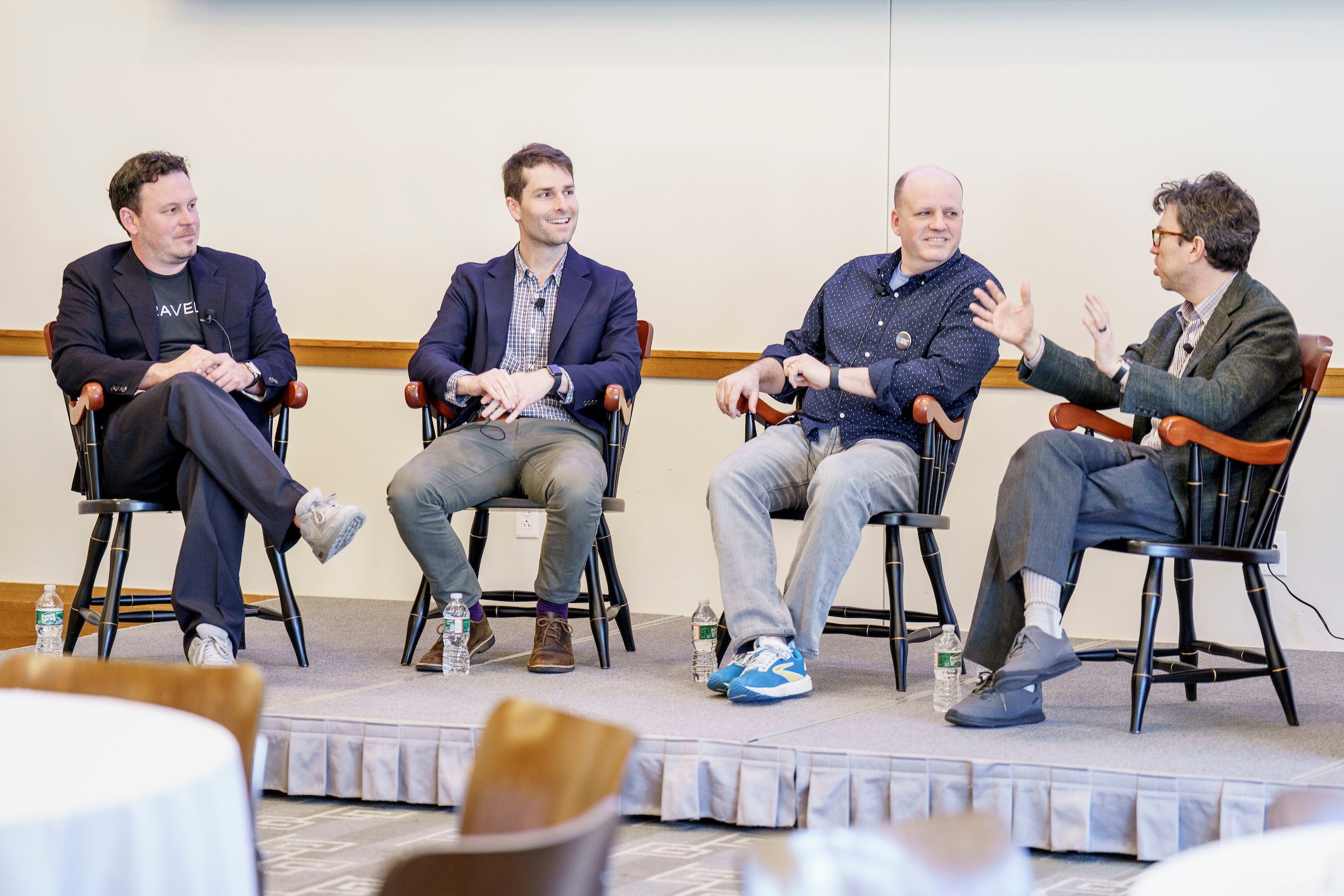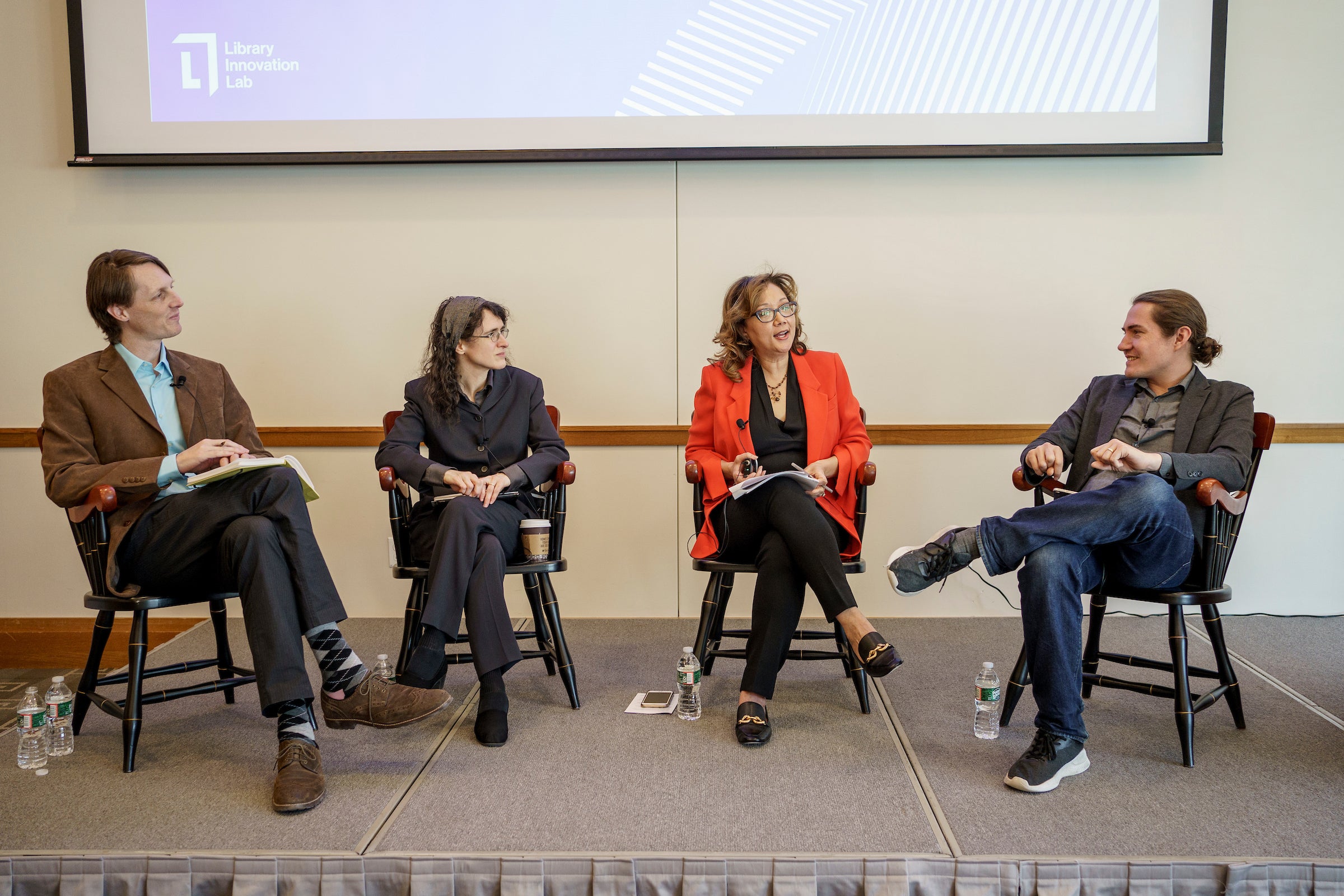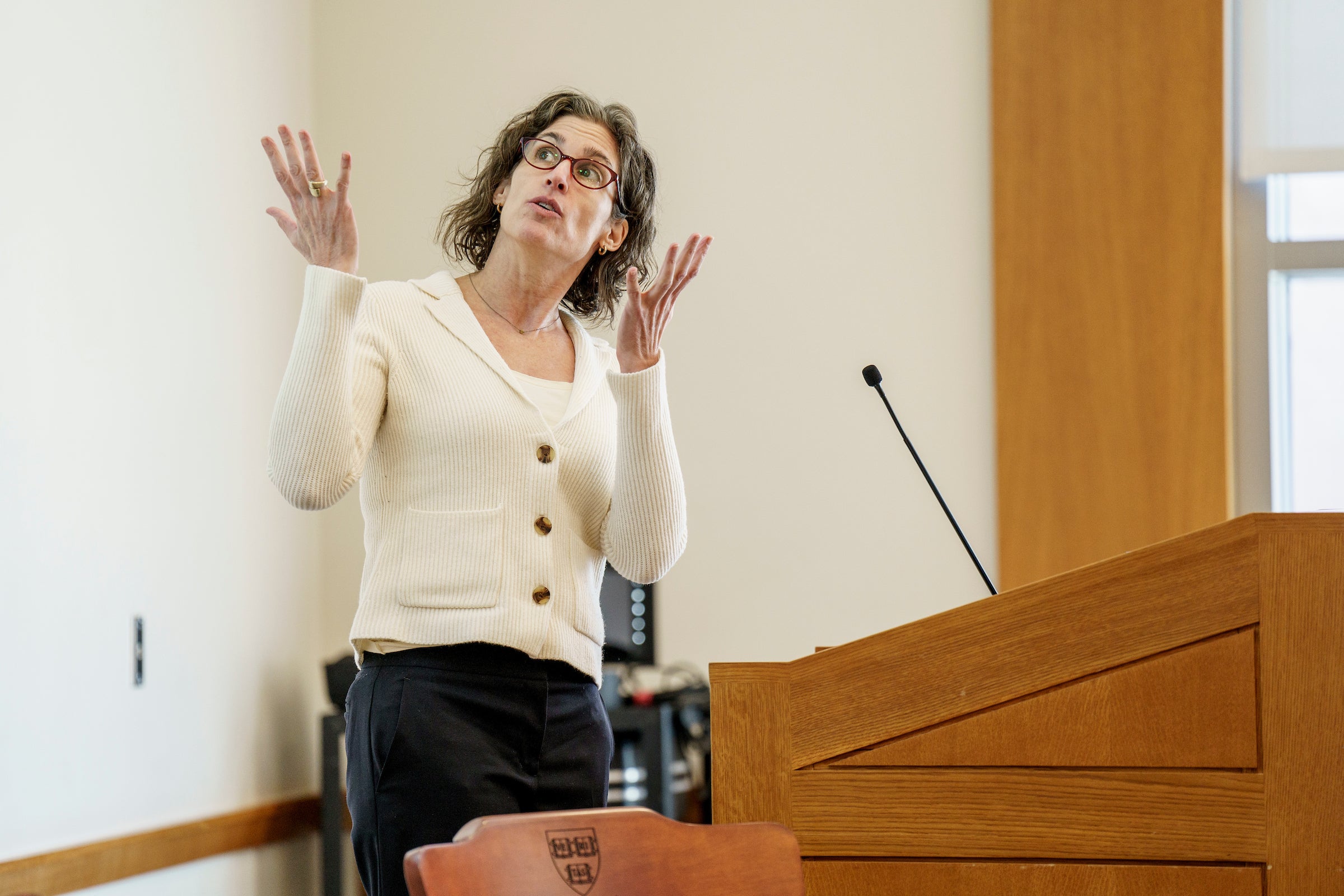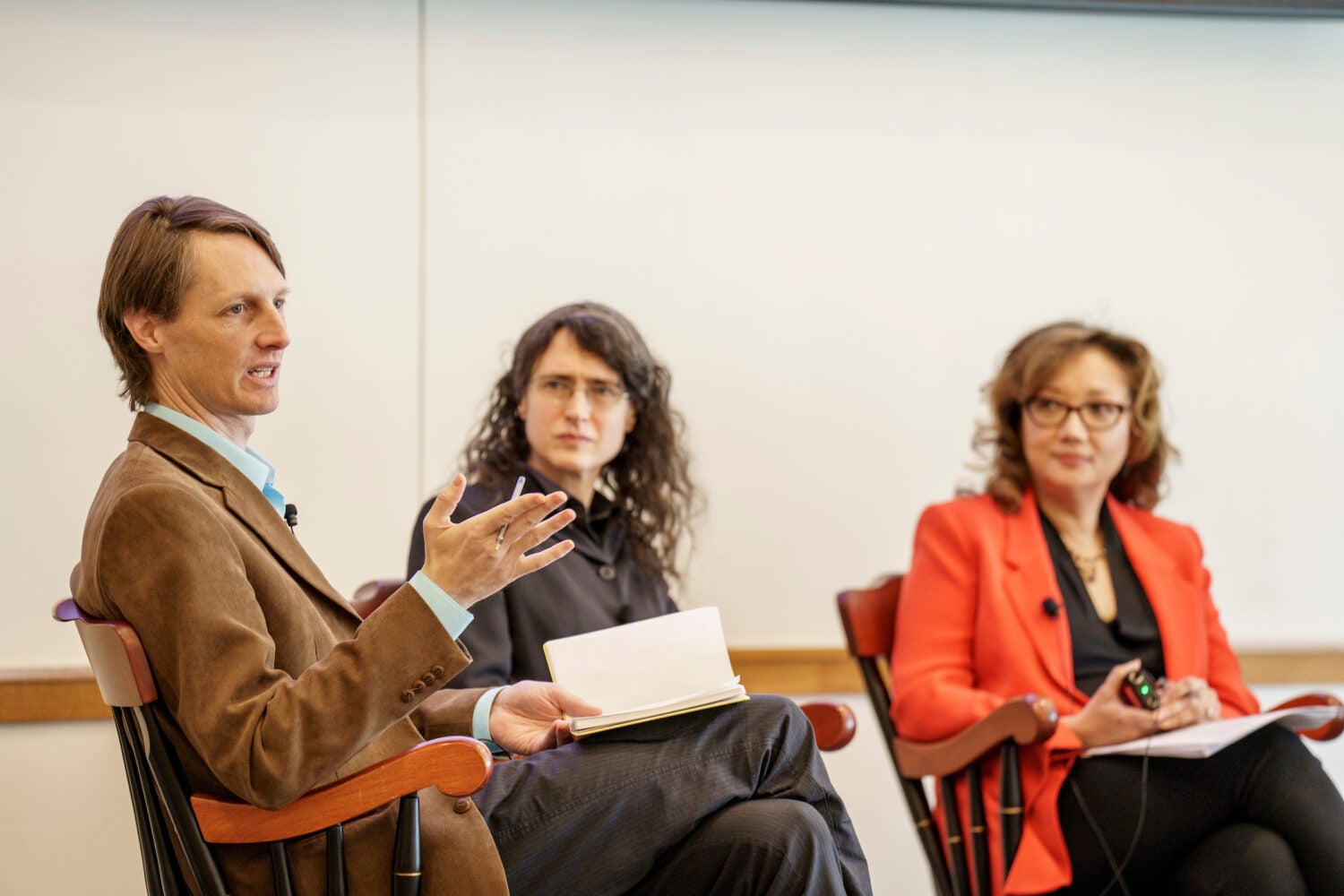A trove of seven million United States legal cases is now freely accessible to the public thanks to an ambitious project by the Caselaw Access Project (CAP), to scan all federal and court cases from the Harvard Law School Library and get them online.
Celebrating the innovative collaborative project, and looking ahead to what this free and open access to the legal documents may mean, the Library Innovation Lab, LIL, marked the occasion with “Transform: Justice,” an afternoon of panel discussions on March 8.
“The library is the laboratory of the law,” said Jack Cushman, director of Harvard’s Library Innovation Lab, introducing the event. “If you want a share in shaping the future, if you want to share in deciding what the law will be and therefore what kind of world we live in, then you need access to that primary source legal material.”
The panels began with a look back at the beginning of the CAP. Jonathan Zittrain ’95, George Bemis Professor of International Law and vice dean for library and information resources, long a champion and guiding force on the project, was not always optimistic. Even after the project found a partner in 2016 in Ravel Law, a legal search, analytics, and visualization platform, he recalled thinking, “This is actually not possible, but let’s just keep on keeping on and see what happens.”
Ravel, however, had been running on a parallel track to LIL since its founding in 2011. Daniel Lewis of LegalOn, who was then the CEO of the California-based company, cited the work by open access advocate Carl Malamud, founder of Public.Resource.Org, to provide public access to legal data as an inspiration. “We had a vision of what we could build,” said Lewis.
When Zittrain and Adam Ziegler, the former director of LIL, who was hired to oversee the project, met with Lewis and Nik Reed, co-founder of Ravel Law (now at Knowable and LexisNexis), they recognized the possibilities. “From the very beginning we realized we shared a goal and even shared an ethos,” said Zittrain. “Instead of blending the worst of both worlds, it feels like we managed to blend the best.”

In return for financial support, Ravel negotiated eight years of exclusivity, which allowed it to market access to the approximately forty million pages that involved. (Ravel was acquired by LexisNexis the following year, with the new parent company continuing the support.) The comprehensive digitization of roughly 6.4 million cases dating back to 1658, which took place at Harvard, explained Ziegler.
“It wasn’t just making money getting acquired,” said Ziegler. “It was about unlocking this challenge.”
The digitization itself required intense planning. Books had to be gathered not only from the Harvard Law School Library but from the vast repository in Southborough, Massachusetts. Then, to make them readable to the high-speed scanner, their spines had to be chopped off with a specialized guillotine, a loud mechanical process. “The floor shakes,” Ziegler recalled. “It’s a constant reminder that books were being destroyed.” In addition, the process was disruptive. “We had to adjust the schedule to make sure that we weren’t slamming the guillotine when students were taking exams.” (The unbound books were then wrapped in shrink wrap and shipped off to storage in a Kentucky limestone mine. “In case of the apocalypse or an EMP burst,” explained Ziegler.)
Citing the challenges, Zittrain was exultant. “Each of us had stakeholders [and] conflicting interests,” he said. “How much worthy work it was to balance that in order to forge something that could sing.”
During the second panel, “The Future of Open Legal Data,” participants Mike Lissner, founder of the Free Law Project; Sara Frug, director of the Legal Information Institute; and Angela Jaffee, an account director at vLex and former national programs administrator for the Administrative Office of the United States Courts, faced the challenges ahead.
Part of that, said Frug, involved refining the concept of who requires access to legal documents as “not just law students nor lawyers nor judges, but the public at large.”

Access alone, continued Jaffee, will not suffice. “It’s difficult for the public to access because there are so many agencies. You have to know what you’re looking for to be able to find it.” The goal, she said, is “robust search functionality” that would make this access practically usable.
“Access to Law is Access to Justice,” a series of presentations, rounded out the afternoon. Carl Malamud began by presenting for the first time a plan for every state law to be deposited with a new federal office, supported by his legal analysis of the Full Faith and Credit Clause of the U.S. Constitution. Malamud, whom Cushman had earlier hailed as “the godfather of open access,” began by recalling one of his first battles for access, which began when he purchased a copy of Georgia’s case law and put it online.
Georgia’s Speaker of the House “was not amused,” he recalled, because the state had granted exclusive rights to the Lexis Corp. The conflict escalated to a legal battle, with the state accusing Malamud of terrorism. Although the case was quickly decided in Malamud’s favor, Georgia appealed to the Supreme Court, where the ACLU joined Malamud’s case.
“The Court agreed with our position that these were edicts of government, which are the law and legal materials issued in the name of the state. Under a 200-year-old common law doctrine, edicts of government are not eligible for copyright protection,” he said. “That is because edicts of government are fundamental to our democracy.”
Despite this decision, the battle is ongoing, with states including Mississippi and Kansas insisting that state laws remain private property. And Malamud continues fighting. “If ignorance of the law is no excuse, how can we have access to justice and due process?”

Alexandra Natapoff, Lee S. Kreindler Professor of Law, then shared her innovative video casebooks. Developed during the pandemic, these online tools (accessible at crbw.law.harvard.edu) present an overview of the case themes and then quickly go through the text of a case, before rounding up with a roughly 10-minute lecture by Natapoff.
“Sometimes we need help figuring out what the law means, what a case means, what courts mean,” she said. Indeed, the necessity to educate people “how to understand law is all of a piece with access to law.”
Concluding the event, Chief Justice Mark V. Green of the Massachusetts Court of Appeals noted, “The milestone that we are here to celebrate today is enormous.” Calling himself a consumer as well as producer of legal content, he declared, “access to law is foundational to the broader goal of access to justice.”
Want to stay up to date with Harvard Law Today? Sign up for our weekly newsletter.
